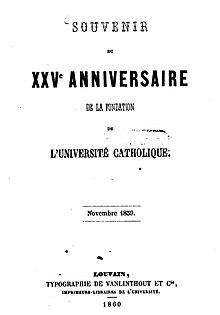Our website is made possible by displaying online advertisements to our visitors.
Please consider supporting us by disabling your ad blocker.
UCLouvain
Université catholique de Louvain | |
 The Sedes Sapientiae, seal of UCLouvain. | |
| Latin: Universitas Catholica Lovaniensis[1] | |
Other name | UCLouvain |
|---|---|
Former name | Université catholique de Belgique |
| Motto | Sedes Sapientiae (Latin) |
Motto in English | Seat of Wisdom, Seat of Knowledge |
| Type | Private, subsidised by public authorities |
| Established | 1425 |
Religious affiliation | Roman Catholicism |
| Budget | €220 million (2017)[2] |
| Rector | Françoise Smets |
Administrative staff | 6,097 (2021) |
| Students | 37,686 (2023-24)[3] |
| 5,088 | |
| Location | |
| Campus | Louvain-la-Neuve, with campuses in Brussels (City of Brussels, Woluwe-Saint-Lambert & Saint-Gilles), Mons, Tournai, Charleroi, Namur, Dinant, Yvoir |
| Colors | Blue and white |
| Nickname | Wolves |
| Affiliations | Guild of European Research-Intensive Universities CEMS CESAER CLUSTER Coimbra Group IMCC EMPA TIME |
| Mascot | Woulfy |
| Website | www.uclouvain.be |
 | |
| Data as of 2011[update] | |

UCLouvain (or Université catholique de Louvain [ynivɛʁsite katɔlik də luvɛ̃], French for Catholic University of Louvain, officially in English the University of Louvain)[4] is Belgium's largest French-speaking university and one of the oldest in Europe (originally established in 1425). It is located in Louvain-la-Neuve, which was expressly built to house the university, and Brussels, Charleroi, Mons, Tournai and Namur. Since September 2018, the university uses the branding UCLouvain, replacing the acronym UCL, following a merger with Saint-Louis University, Brussels.
The original University of Louvain (Universitas Lovaniensis) was founded at the centre of the historic town of Leuven (or Louvain) in 1425, making it the first university in Belgium and the Low Countries, and abolished by law in 1797. This university was the centre of Baianism, Jansenism[5] and Febronianism in Europe. A new university, the State University of Louvain, was founded in 1817 and abolished by the law in 1835. A new catholic university was founded in Mechlin in 1834, the Catholic University of Mechlin and moved to Leuven in 1835 that is frequently, but controversially, identified as a continuation of the older institution.AB In 1968 the Catholic University of Leuven split into the Dutch-language Katholieke Universiteit Leuven, which stayed in Leuven, and the French-language Université catholique de Louvain, which moved to Louvain-la-Neuve in Wallonia, 30 km southeast of Brussels. Since the 15th century, Leuven/Louvain, as it is still often called, has been a major contributor to the development of Catholic theology.
- ^ Anderson, Peter John (1907). Record of the Celebration of the Quatercentenary of the University of Aberdeen: From 25th to 28th September, 1906. Aberdeen, United Kingdom: Aberdeen University Press (University of Aberdeen). ASIN B001PK7B5G. ISBN 9781363625079.
- ^ "Zahlen auf dailyscience.be" (PDF).
- ^ "Chiffres de la rentrée 2023-2024 - Étudiantes et étudiants par université et par secteur d'études" [Figures for the 2023-2024 academic year - Students by university and by sector of study]. www.cref.be (in French).
- ^ "University of Louvain - EUTM file information". European Union Intellectual Property Office. 2017. Retrieved 16 May 2018.
- ^ Dictionnaire historique de la Papauté, sous la direction de Philippe Levillain, éd. Fayard, 1994, sub verbo "Innocent XII Pignatelli 1691-1700" : "Bien que la théologie et l’éthique jansénistes dans leurs postulats théoriques et pratiques aient été largement rejetées par le Saint-Siège, elles sont encore bien loin de disparaître de la vie de l’Église à la fin du XVIIe siècle. À l’époque d’Innocent XII, quelques groupuscules plus combatifs ont quitté la France et se sont transférés en Belgique et en Hollande, d’où ils redoublent d’activité, souvent en conflit avec les directives de Rome. L’université de Louvain est leur forteresse". Daniel Tollet et Pierre Chaunu, Le jansénisme et la franc-maçonnerie en Europe centrale au XVIIe et XVIIIe siècle, p. 143 : "Louvain plaque tournante des idées jansénistes", and Henri Francotte1, professeur à l'université de Liège, La Propagande des encyclopédistes français au pays de Liège (1750-1790), Bruxelles : Hayez, 1880, p. 28. : "le jansénisme régnait en maître à l'université de Louvain".
Previous Page Next Page
الجامعة الكاثوليكية (لوفان) Arabic کاتولیک لوون بیلیمیوردو AZB Лувенскі каталіцкі ўніверсітэт BE UCLouvain Catalan Université catholique de Louvain Czech Université catholique de Louvain Danish Université catholique de Louvain German Katolika universitato de Loveno (Valonio) EO Universidad Católica de Lovaina Spanish Université catholique de Louvain ET


